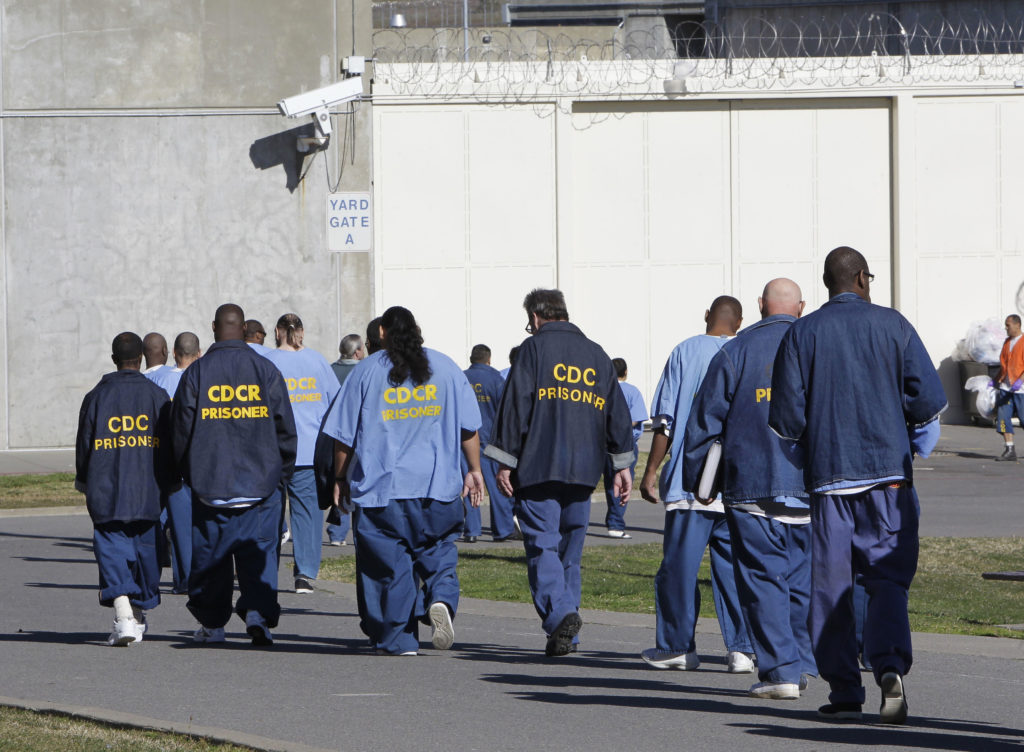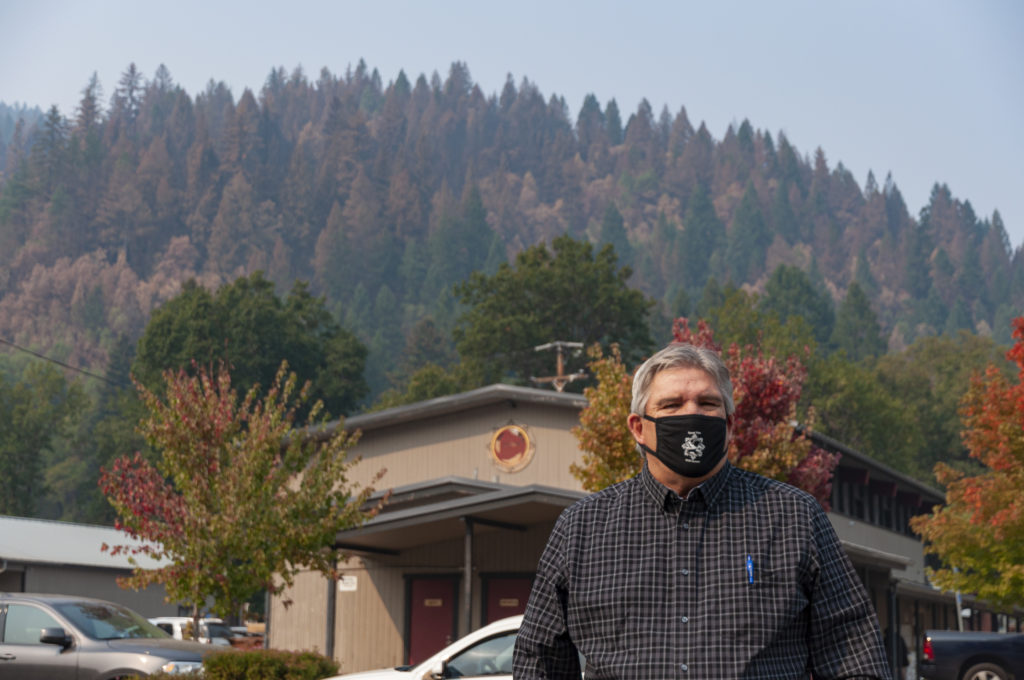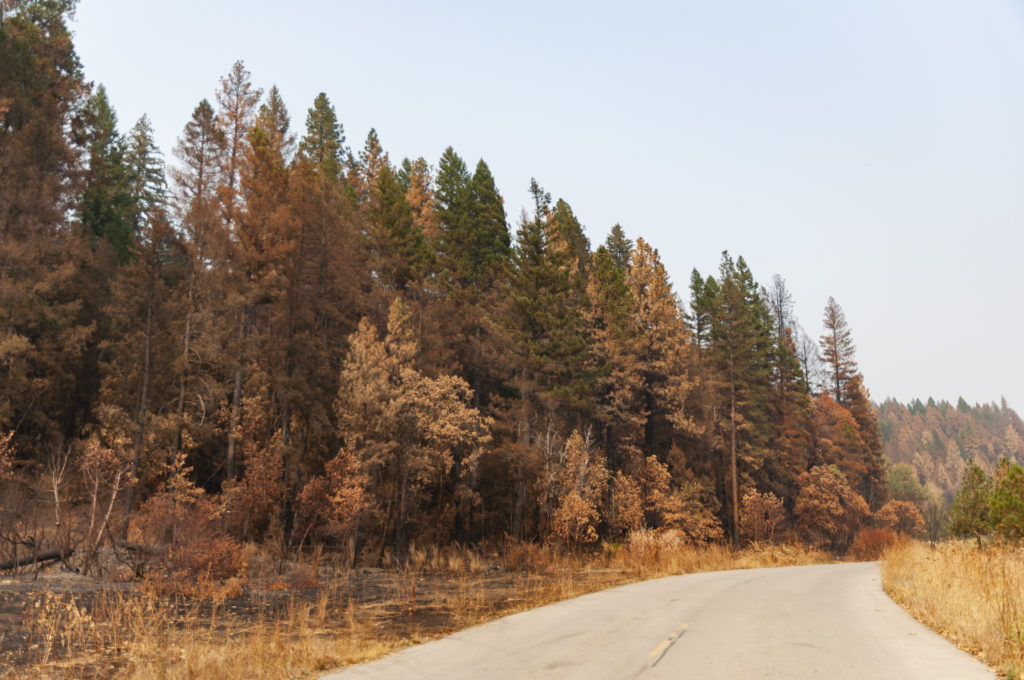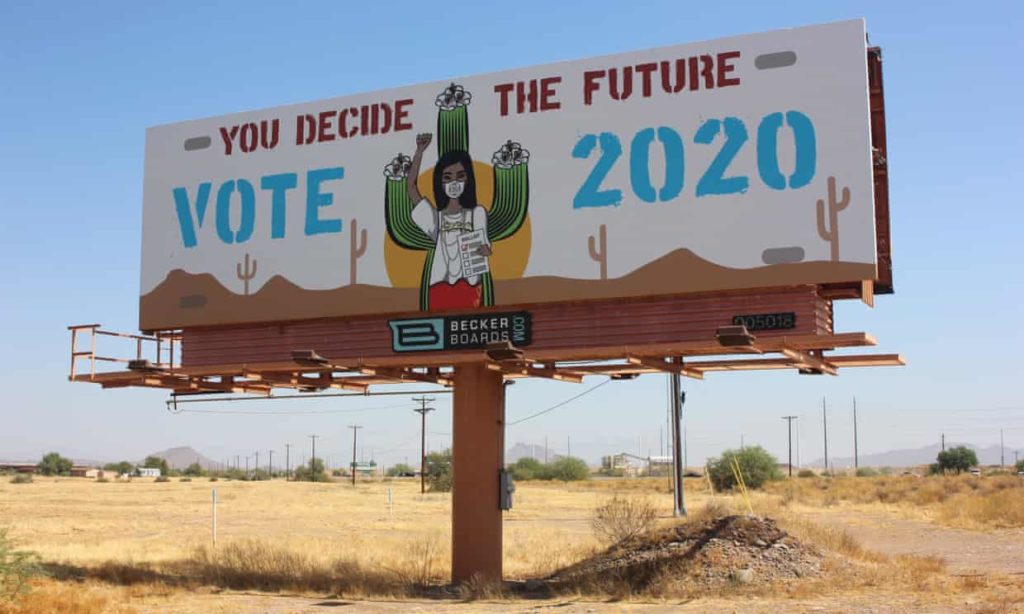Postcards from our Report from America corps members covering voting rights on the ground across the country.
Who are the people?
It’s the fundamental question of American democracy, the automatic follow-up to the first three words of the U.S. Constitution: We the people.
When the Constitution was first written, “We the people” didn’t include certain races, ethnicities, genders and economic classes. The electorate has expanded in chunks over the years: non-property-holders in the 1820s, African American men in 1869, women in 1920, Native Americans in 1957. Even then, many Black and brown Americans were blocked from the polls by poll taxes and discriminatory literacy tests until such tactics were banned by the 1965 Voting Rights Act.
Today, amidst battles over mail-in ballots and voter rolls, there are still people living on the fringes of citizenship, for whom voting is not a given.
“The redeeming quality of America is the ability to redeem itself, to make the choice to redeem itself through political expression,” said Jacqueline De Leon, an attorney with the Native American Rights Fund. “We also need to live up to it and I just don’t think we do a good job of doing that.”
We met with voters and advocates across the American West who don’t know whether their vote will be counted this year: an activist on parole for a felony conviction, an unhoused man living in a riverside park, Karuk tribal leaders trying to manage the fallout from California’s wildfires and a Navajo jeweler who doesn’t have a home mailing address.
It all adds up to a picture of an America that still is short of its billing as a democracy by, and for “we the people.”
‘A strong democracy includes all the citizens’

OAKLAND, Calif. — For John Vasquez, a 43-year-old policy coordinator at the youth mentorship nonprofit Communities United For Restorative Youth Justice, uplifting the political power of formerly incarcerated communities isn’t just a job. It’s personal.
Vasquez grew up in south Sacramento, an area known for its street gangs, and was a member of the Barrio Franklin Boulevard gang. Driven toward gang life after his dad’s passing and in the midst of his mom’s drug addiction, he said it was the closest support system he could find.
At 16 years old, he was sentenced to 31 years to life for shooting and killing Robert Maisonet, a 19-year-old rival gang member.
“I really had no hope of getting out. I just didn’t really care, to be honest with you,” Vasquez said.
He spent the next several decades cycling through the public prison system, until being released on parole in 2019. When he got out, he found an apartment and eventually a job with CURYJ. But one thing was missing: he wasn’t allowed to vote.
There are over 25 million residents registered to vote in California, but the progressive state does not currently allow people with felonies to vote until their imprisonment and parole are completed. It’s a more open system than Florida, where efforts to grant individuals with felony convictions to vote have been undermined by Republican leadership, but Vasquez says it’s not enough.
Get the Latest Dispatches from across America
Sign up for our weekly On the Ground round up
“If we’re going to talk about a strong democracy then that’s going to include all the citizens in California,” Vasquez said.
This year, CURYJ has launched a voting-rights initiative to mobilize community members around the city, particularly in East Oakland. This large swath of the city has historically been a hotbed for violent crime. Recent investigations show that economic inequality is a factor in the area’s violent crime rates.
Vasquez is leading CURYJ’s outreach and social media education efforts to get people to vote for Proposition 17, a constitutional amendment that would allow Californians on parole for felony convictions to vote, and against Proposition 20, a complex bill which would result in rollbacks to recent criminal justice reforms.
This initiative to mobilize parolees like Vasquez is a part of a larger effort by a network of nonprofit organizations known as Oakland Rising, a collaborative which aims to mobilize historically disenfranchised communities to vote.
Regardless of whether Prop 17 passes or not, Vasquez believes that education is the first step towards the formerly incarcerated, particularly Black and Latino folks, understanding their voting power. “A lot of people don’t know that in California, people on probation are allowed to vote. There are people in the county jail right now that are allowed to vote, but I’m on parole and I’m not,” He said. “There’s something wrong with that picture.”
— Ricky Rodas, The Oaklandside
‘I don’t know whether you counted me or not’
RENO, Nev. — Barbara Bennett Park is a lively scene of basketball players, dog walkers and families splashing in the Truckee River that flows alongside the park. This is where Doug Sobolik, 50, spends his days.
Sobolik has experienced homelessness for nearly eight years and formed a tight-knit community here, which he considers his family. The group comes together at this park everyday. They look out for one another, share food and watch each other’s belongings.
But for some political candidates, Sobolik and his community are seen as a problem at the park. Sobolik said he’s had several disheartening interactions with those running for office.
“They say that this is a problem park. That we’re all drug dealing thugs and no good, undesirable homeless,” Sobolik said, recalling one candidate who was accompanied by security, “If you can’t come up to your constituents, you have no business representing them.”
Sobolik wants a candidate who pushes for clean air, fresh water and accessible bathroom units and showers for people spending their time outside all day.
“I’ve been out here, this will be going on to eight years,” Sobolik said, “We have solutions because we have to live through this, but they don’t come ask us. They don’t come to work with us.”

Sobolik registered to vote in 2018, but his voter status is now inactive. That means somewhere along the line Sobolik’s election mail was returned to the Washoe County Registrar of Voters’ office and deemed undeliverable, according to the registrar’s office.
Nevada is an important swing state this year, and one of the several that have expanded its absentee balloting program due to COVID-19. Every registered voter will be sent an absentee ballot and can still vote in person. Sobolik is not likely to be among them.
He said the entire process is confusing.
“It makes me apprehensive to even want to go anywhere in-person or by mail. How the hell am I supposed to mail something in? I don’t even got 25 cents.” Sobolik said. “It makes me feel like even if I voted, I don’t know whether you counted me or not.”
Sobolik isn’t the only unsheltered person who might have a hard time voting in Washoe County this year. Out of the estimated over 1,000 unsheltered individuals in Washoe County, there are 220 inactive registered voters and just 102 active registered voters.
The director of the National Coalition for the Homeless, Donald Whitehead, listed several barriers to voting, including transportation to the polls and lack of access to technology.
“Perhaps the biggest barrier is just the address,” Whitehead said, “The address to get voting rights materials, to register, to be able to go to the right precinct.”
For Sobolik and other unsheltered individuals, the feeling of uncertainty around voting ultimately results in not casting their vote in this swing state.
“They called us the criminals. They called us the undesirables,” Sobolik said, “We have been left behind.”
— Lucia Starbuck, KUNR Public Radio
‘One disaster, and then another one’

HAPPY CAMP, Calif. — Fall colors are not common on the slopes of the Siskiyou Mountains. But this October, the evergreen hills surrounding the remote riverside town of Happy Camp, population 1,190, are sporting an eerie mosaic of green and orange. The trees’ sandstone-colored needles are not preparing for winter — they were toasted by fire.
The Slater Fire began during the night of Labor Day, fanned by a historic windstorm that whipped down the West Coast and started near-simultaneous blazes from Washington to northern California. By 11 a.m. the next morning, the flames had reached the edge of Happy Camp. The town’s residents scattered.
“It all happened very fast,” said Buster Attebery, chairman of the Karuk Tribe, the second-largest federally recognized tribe in California whose headquarters are located in Happy Camp. Attebery said more than 200 homes are estimated to have been lost in the fire, displacing as many as 60 tribal members.
Crews were able to curb the blaze before it engulfed the town of Happy Camp proper. Still, hundreds of people remain displaced and unable to return to their homes within the more than 155,000-acre burn area. They’re everywhere from motels in Yreka to relatives’ homes in Redding.
The worst West Coast wildfire season in recent history had bad timing: In a particularly contentious election year relying heavily on mail-in ballots, tens of thousands of people were displaced from their homes. And in many cases, voting is the last thing on their minds.

“When the fire was happening and we were all evacuated, I just could not stop thinking about what it would do to our election,” said Michelle Spence, secretary of the Karuk Tribe’s election commission. In Happy Camp, the Karuk cast ballots for their tribal council at the same time and place as Siskiyou County, in a gym next to the tribal administration building. Now, that gym is being used as a food bank for fire victims and the tribal polling place will be moved to a building in the Karuk Housing Authority several hundred yards away. The county won’t have a physical polling place this year and has instead mailed ballots to all of the town’s registered voters.
Spence said it’s been difficult to notify tribal voters of the change. Though tribal polling places downriver in Orleans and upriver in Yreka were untouched by fires, the majority of registered in-person voters live in Happy Camp.
The Slater Fire also caused the election commission to delay sending out absentee ballots, giving mail-in voters less time to fill out their ballots and send them back. In some cases, displaced people won’t even receive their ballots. Attebery said he expects voter turnout to be lower this year as a result, on top of the fact that less than 30% of eligible Karuk voters are registered to vote. Of those registered, more than half vote absentee.
“We’re just hoping for the best at this point,” Spence said. “It just seems like we’ve been hit with one disaster and then another one.”
— Alex Schwartz, Herald and News
Sign Up for GroundTruth Weekly
‘Is it worth it?’

CAMERON, Ariz. — Every morning, Milford Huskie loads a pair of plastic tubs in the back of his SUV and heads a few miles down Highway 89 toward the border of the Navajo Nation. He pulls off the road at a row of wind-ragged, plywood stands and starts to unpack necklaces and bracelets stacked with turquoise and cedar seed beads.
The flow of passing tourists — potential customers — has been anemic this year, sharply curtailed by COVID-19 fears and Navajo Nation shutdowns. But it’s what he has to do. He never received a CARES Act stipend when they shipped out earlier this year, and work here is hard to come by.
Huskie is planning to vote by mail — he saids he feels like he has to with everything going on — but he’s still skeptical.
“Is it worth it sometimes?” he asked. “We’re not getting help from the government.”
That lack of trust is one obstacle to political participation on tribal reservations like the Navajo Nation. But as mail voting increases across the country, Navajo residents are facing another issue shared with rural Americans across the country: mail access is uniquely difficult.
Related: ‘Mail voting doesn’t work for Navajo Nation’: Native Americans face steep election hurdles
Huskie is one of the many Navajo Nation residents that don’t have at-home mail delivery. For years he shared a P.O. box with family, until recently the postmaster forced him and a few siblings to get a different box.
“[They] said we couldn’t be sharing that box, but we’d been doing it since we were kids,” said Huskie.
Huskie and his brother got a new box, but they stopped receiving some of their mail. It was still addressed to their old shared P.O. box, and the U.S. Postal Service doesn’t deliver mail if the name does not match one of the names registered to a P.O. box.
Still, Huskie is one of the lucky ones: He was able to rectify the situation in time to vote by mail in the primary lives only a few minutes from the post office. Tribal advocates estimate that some rural-dwelling Native Americans have to drive anywhere from 40 to 150 miles roundtrip to pick up mail.
If a voter is able to pick up their mail and fill out a ballot, they could still have problems getting it back on time. A study from voting rights group Four Directions showed that mail delivery from some reservation post offices to their respective county recorder office could take up to six days.
Other rural populations face similar issues, but Native American Rights Fund attorney Jacqueline De Leon says county officials aren’t as responsive to Native populations, and aren’t as quick to implement solutions:
“There’s a feeling of county officials that native citizens are not county citizens,” said De Leon. “They see them as ‘Well they’ve got their government so they don’t need to participate in ours.’”
Henson plans on voting by mail this year if his ballot comes on time, and in person if it doesn’t. He’s not excited but he feels like in this wild year, voting isn’t just for fun. It’s a duty.
— Isaiah Murtaugh, The GroundTruth Project
This article, a collaboration between Report for America corps members and GroundTruth reporting fellows, is part of a reporting effort by the GroundTruth Project on voting rights in America, with support from the Jesse and Betsy Fink Charitable Fund, the Solutions Journalism Network and the MacArthur Foundation.

































